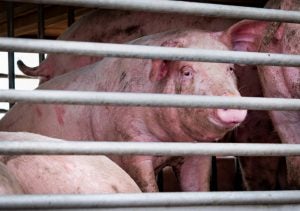Pork buyers such as China are shutting down imports of German pork after continued outbreaks of African swine fever. Worldwide pork production is highly interconnected — this connectivity provides opportunities for an increased risk to U.S. pork producers.
While African swine fever is not a concern for human health, it is highly contagious and deadly to domestic and feral swine. The world food trade has been distorted since the outbreaks — most countries will not import pork from regions suffering from the disease. The United States currently exports about 28 percent of the pork produced here — a feral and domestic outbreak would immediately halt exports.

In June, five countries — Italy, Moldova, Poland, Romania, and Ukraine — reported 23 ASF outbreaks in domestic pigs. Some other notable statistics from the Swine Health Information Center include:
- Italy reported its first outbreak on the mainland, culling 1,000 pigs.
- Poland faced its first outbreak in domestic pigs in 2022, which affected 2,158 hogs.
- Nepal found two cases of ASF in their hogs, which affected 524 pigs.
- India faced an outbreak last month on a government pig breeding farm.
- China had 21 pigs tested positive in May. 454 were considered at risk, and all were slaughtered.
- Poland was hit by ASF outbreaks in Greater Poland, the largest pig-producing region in the country. Within one week, 88 domestic pigs tested positive in a neighboring county.
- Algeria faced seven FMD outbreaks that affected cattle, goats, and sheep.
Most recently, Germany has been facing an outbreak with confirmed cases in Brandenburg and Lower Saxony. Lower Saxony is one of the country’s largest pig farming regions, producing about 30% of the pig stock in Germany. In response to the outbreaks, 280 pigs and 1,500 piglets will be slaughtered on Sunday.

Wild hogs remain a concern for the spread of ASF. According to the European Commission Animal Disease Information System, ten countries have been affected by ASF outbreaks in wild boars. Just this year, ASF outbreaks in wild boars have reached 4,106. European agencies are attempting to contain and reduce wild boar numbers. However, the number and span of the species have made it difficult to control.
The USDA is already taking measures against the disease in the United States. Earlier this year, the U.S. Department of Agriculture’s Animal and Plant Health Inspection Service and the Canadian Food Inspection Agency developed protocols to ensure that bilateral trade can continue even if ASF is detected in wild hogs — so long as it is kept absent from domestic pigs.
It’s integral that producers practice biosecurity measures and avoid transmission from foreign countries. An ASF vaccine is currently in the testing phases. ARS scientist Manuel Borca said just months ago, “These safety studies bring this vaccine one step closer to being available on the market.”


